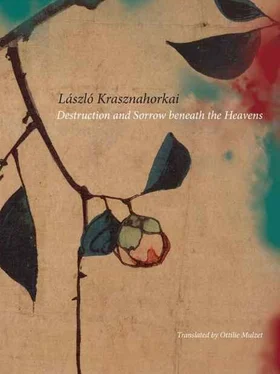Nonetheless, when I was 21 years old or so, when I began to be acquainted with the Western intellectual world, I came across, for example, the notion of democracy. There is nothing like it in Chinese culture. Of course, I understood that this was a very good thing. Equality, freedom, democracy. I thought that all these were very positive, appropriate concepts. And at once these concepts began to be incorporated into my own Chinese culture. And since the basis, the starting point, and the roots of my thinking all originate from Chinese culture, the information and influences I acquired from abroad never really drew me away from my own culture. There came to be a kind of balance within me, and that was possible only because I based my own culture upon that of Laozi and Zhuangzi, both of whom taught us that if your inner world is free, then you too are free. So we can state that whether it be a question of Confucius or Laozi, everyone here is somehow influenced by the Chinese culture of ancient times.
But if you go deeper, then you have to speak about the intelligentsia. In our tradition, the intelligentsia has always been comprised of the best, the noblest part of society. They are the people who protect tradition. Without them, there is no progress and no culture. So they are the most important: they are the brains that think. As for the workers — manual labourers, peasants — thinking is not their strong point. They are under the influence of the wider public. Their thoughts are ordinary thoughts. What they think about is ordinary, and what they do is ordinary. Nevertheless, they live their lives under the influence of our ancient civilization. While they are unchanging and perpetual, the intelligentsia, and only the intelligentsia is rejuvenated again and again in its own spirit: they, the literati, are the ones who turn to the spirit until they begin to perceive the true meaning of life.
Then I would say that I. . I will speak a little about myself. I have children: there is Lian, there is my daughter, there is my younger son, I have three children. Their opinion of me is very good. They love me very much. And I can say that there are no generational conflicts between us. Because I am an intellectual, I have never had and still do not have any great desire to pressure them. I have always spoken to them freely and I continue to do so, not just to them but to anyone with whom I may have had the opportunity to speak. I believe that if one speaks freely and openly, there can be no faults in his speech. And if I am not right, you should interrupt me. My daughter says that I am the best person in the world. She says you can’t find anyone like me anywhere. Someone who lets her speak. Who lets her say what she really wants to say. There are some truths that I say, and some truths that she says: if she is right, I accept it. If she is right, I adjust my opinion. I can even accept that part of your opinion which isn’t right. I never say: I will not permit this. . Do what you like. I know, of course, what isn’t right. There is my younger son. When he was a soldier, around the age of 20, what happened? There is a very bad tradition in the Chinese army — everyone smokes cigarettes. They smoke dreadfully! It is bad for one’s health. But I never said to my son: Stop smoking! He stopped by himself. The correct thing, therefore, is to let a person decide freely for himself.
Maybe that’s why my children love me. They tell me their worries, and I tell them what I think about them. But I do not force my opinions on them. It’s possible that my opinion is not always correct. They must decide. They must think over whether it is correct or not.
Well, now, getting back to the intelligentsia: they are the people who bear the glory of a better world. This is very important for our tradition. That this quality of humanity exists: the quality of the intelligentsia in Chinese culture. This is a huge difference between the Western and Eastern systems. From early times, European states strived to be forceful military powers. A European state always devoted serious attention to the military side of things. The most outstanding people were always those who could kill the most enemies. At the same time, here in China, Confucius tells us: ‘I do not think much of those people who are brave in reaching the eastern sea while carrying mountains on their shoulders. . I do not value such people very much. I like people who think.’ So: those who think, those who teach are important. Well, that is our tradition.
And this tradition is very closely linked to language. Our language is comprised of characters contained in squares — every single character can fit, with perfect proportions, into a square frame. There is great meaning to this. And every cultivated intellectual was and is aware of the significance of this.
The guest interrupts, saying that he, Stein, has a different view of Confucianism, but that he does not live, nor has he ever lived, in China. And that he has as much esteem for Confucius as for Laozi and Zhuangzi. Because, he goes on to explain, for him Confucianism is the only social philosophy which introduces the concept of morality into everyday life. Christianity was not able to do this. And when he has spoken of that here, every one of his interlocutors nodded, telling him he was right and saying that without Confucianism there would be no China. They also told him that although they sensed how much danger there was in the development of contemporary society, they denied that Confucianism had disappeared from the societal order. This, said Stein, was really shocking, because his experience has been precisely the opposite.
yang. I agree with you. The Confucian school of thought had a good effect on people. It always placed morality above success. You can be successful, you can be a successful official, but from the viewpoint of morality this means nothing. Confucius said: Place morality above success. This Confucian influence was without a doubt good. I agree. And in that sense as well, Confucianism had a greater influence here than either Buddhism or Christianity. The Christian and Buddhist religions are both very good. As far as I can see — and I attended a Methodist school, so I know about it — Christianity is a very positive religion, first and foremost, because it devotes special attention to love. It says that you must love other people. This is much more important to me than Confucian morality. Because here in China we never paid enough attention to personal love. There are two kinds of people who are difficult to deal with: children and women, as both are led by their emotions. Confucius never spoke about the love between a man and a woman. He never engaged with the question of love. In Christianity, by contrast, love is at the very centre of things, and this has deeply touched me. In my life, this always meant: love your children. More precisely: show your love to your children. This is more important than anything else. This is what has caused, and still causes, so many problems for us. Everyone tortures their children, saying, study, study, but there is no love ! Everyone will say to you: But I love my children! Then my answer would be: So then love them, really! Show them that you love them! The greatest mistakes, the greatest misapprehensions and the greatest lack of understanding all stem from this. So, to summarize, I truly respect Christianity because it emphasizes the importance of love.
Buddhism speaks of emptiness, the emptiness of all that exists, that is, the end of everything is emptiness. I believe that this is perfectly, immaculately true. Everything has a beginning, everyone and everything must live and then must die, everything and everyone must come to an end; the universe too will come to an end. We don’t know what the beginning of time was, nor do we know what the end will be. We know that there are boundaries, but we also know that, in reality, everything is boundless. It is never possible to come to the end of anything. We have knowledge neither of the small nor of the large: neither of the small nor of the large epochs, neither of the small nor of the large domains. And then Buddhism comes along and says that everything is empty, everything becomes empty. And this is irrevocably true. This is the whole truth. I believe we must learn from this. I do not believe that we need to devote too much attention to fate, to the world, because all this will become empty. Our own lives will also become empty. Nothing. This is what Buddhism teaches, and that is why I hold Buddhism in great esteem.
Читать дальше












